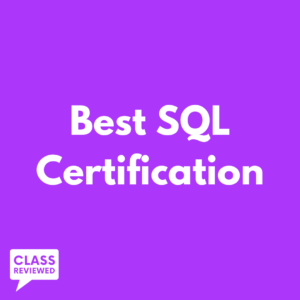Learning SQL and database development can have numerous benefits for individuals and organizations. The first step is to get SQL certified in a top-rated SQL class. We have reviewed and compiled the best SQL certification courses for you.
Top 10 Best SQL Certification Classes
- The Complete SQL Bootcamp: Go from Zero to Hero ⭑⭑⭑⭑⭑ 4.7/5.0 – 156,694 ratings – 608,290 students
- SQL Masterclass: SQL for Data Analytics ⭑⭑⭑⭑⭑ 4.5/5.0 – 10,892 ratings – 405,246 students
- The Ultimate MySQL Bootcamp: Go from SQL Beginner to Expert ⭑⭑⭑⭑⭑ 4.6/5.0 – 75,916 ratings – 355,793 students
- SQL – MySQL for Data Analytics and Business Intelligence ⭑⭑⭑⭑⭑ 4.6/5.0 – 45,486 ratings – 183,546 students
- The Complete Oracle SQL Certification Course ⭑⭑⭑⭑⭑ 4.6/5.0 – 39,500 ratings – 150,966 students
- SQL for Beginners: Learn SQL using MySQL and Database Design ⭑⭑⭑⭑⭑ 4.5/5.0 – 40,198 ratings – 130,589 students
- Introduction to Databases and SQL ⭑⭑⭑⭑⭑ 4.8/5.0 – 178 ratings – 21,162 students
- SQL: Learn SQL Database Queries and SQL Basics ⭑⭑⭑⭑⭑ 5.0/5.0 – 8,341 students
- Learn SQL Basics for Data Science Specialization ⭑⭑⭑⭑⭑ 4.5/5.0 – 8,120 ratings – 172,970 students
- Data Science Fundamentals with Python and SQL Specialization ⭑⭑⭑⭑⭑ 4.6/5.0 – 2,076 ratings – 28,012 students
4 Free SQL Courses Online
Bookmark this page as we will continue to add free SQL classes to this section as we discover new, high-quality database courses!
#1 – Full Database Course & SQL Tutorial
#2 – SQL Tutorial for Beginners
#3 – Learn Basic SQL
#4 – SQL for Beginners
What is SQL?
SQL or Structured Query Language is a computer programming language used to retrieve and edit data stored in relational databases. It is used in a variety of industries, including finance, healthcare, and technology, and is an essential skill for many roles in data analysis, data science, and software development. By learning SQL and database development, individuals can improve their problem-solving and analytical skills, as well as their ability to work with large and complex data sets. In addition, a strong understanding of SQL and database development can make individuals more competitive in the job market and can open up new career opportunities. Getting your SQL certification and learning database development is a valuable time and monetary investment.
3 Reasons You Should Learn SQL
First, SQL is a widely used programming language, and a strong understanding of SQL is essential for many roles in data analysis, data science, and software development. It is used in a variety of industries, including finance, healthcare, and technology, and is a valuable skill to have on your resume. Companies often look for candidates who have experience with SQL when hiring for positions that involve working with data, and a certification in SQL can make you more competitive in the job market.
Second, learning SQL will improve your analytical and problem-solving skills. SQL allows you to query and manipulate data stored in databases, which requires critical thinking and the ability to break down complex problems into smaller, more manageable pieces. These skills are highly transferable and can be useful in a variety of work settings.
Third, learning SQL can help you get a new high-paying career. Many companies rely on large and complex data sets to inform their business decisions, and professionals who are skilled in working with this data are in high demand. By learning SQL and gaining experience with database development, you can position yourself for roles that may not have been available to you before. In summary, getting an SQL certification is a smart investment in your professional development that can lead to new career opportunities and improve your problem-solving and analytical skills.
SQL Real-World Use Cases
SQL is a versatile programming language with many real-world use cases. Here are a few examples of how SQL is used in various industries and settings:
#1 – Data Analysis: SQL is commonly used to extract, manipulate, and analyze data from databases. This can be useful for a variety of purposes, such as identifying trends and patterns, generating reports, and making data-driven decisions. For example, a data analyst working for a retail company might use SQL to analyze customer purchase data to identify popular products or to identify trends in customer behavior.
#2 – Business Intelligence: SQL is often used to support business intelligence (BI) systems, which are used to collect, store, and analyze data to support decision-making. BI systems can help businesses gain insights into their operations, identify areas for improvement, and make data-driven decisions. For example, a BI system might use SQL to extract data from a company’s sales database to generate reports on sales performance or to identify trends in customer behavior.
#3 – Web Development: SQL is often used to manage and manipulate data stored in databases that are used in web applications. For example, an e-commerce website might use SQL to store customer information, product listings, and order data in a database. SQL is used to retrieve this data and display it to users or to update the data based on user actions, such as adding items to a shopping cart or placing an order.
#4 – Data Science: SQL is a valuable skill for data scientists, who use data to solve complex problems and make data-driven decisions. Data scientists might use SQL to extract and manipulate data from databases for use in machine learning models or to perform statistical analyses. For example, a data scientist working for a healthcare company might use SQL to extract patient data from a database and analyze it to identify trends in patient outcomes or to develop predictive models.
SQL is the most used database programming language that has many real-world use cases in a variety of industries. It is an essential skill for professionals working with data, and a strong understanding of SQL can open up new career opportunities and enhance your problem-solving and analytical skills.
Best SQL Alternatives
There are several alternatives to SQL that may be used for managing and manipulating data stored in databases. Here are a few examples:
#1 – NoSQL: NoSQL (Not Only SQL) is a class of database management systems that are designed to handle large and complex data sets that may not fit well into a traditional relational database. NoSQL databases are often used when scalability and flexibility are more important than the ability to run complex queries. NoSQL database examples: MongoDB, Cassandra, and Couchbase
#2 – MySQL: MySQL is a common web host, open-source database management system that is based on SQL. It is widely used for web applications and is known for its performance, reliability, and ease of use. MySQL supports a wide range of data types and can be used for a variety of applications, including data warehousing, e-commerce, and content management systems.
#3 – PostgreSQL: PostgreSQL is another open-source database management system also using SQL. It is known for its support for a wide range of data types and its ability to handle complex queries and data processing tasks. PostgreSQL is often used for data warehousing, business intelligence, and web applications.
#4 – SQLite: SQLite is a lightweight, open-source SQL database management system; best for apps that require a small, embedded database, such as mobile applications and web browsers. SQLite is known for its simplicity and ease of use, and it does not require a separate server to run.
There are several alternatives to SQL that may be used for managing and manipulating data stored in databases. The best alternative for a particular application will depend on the specific requirements of the project and the available resources.

How to Select the Best SQL Certification Class
There are many online SQL certification classes available, and the best one for you will depend on your goals and your prior experience with SQL. Here are a few factors to consider when looking for SQL certification classes online:
#1 – Content: Look for classes that cover the topics you are most interested in and that align with your goals. Some classes may focus more on basic SQL concepts, while others may delve into more advanced topics, such as database design or data analytics.
#2 – Instructor: Consider the instructor’s background and experience. Look for instructors who have a strong track record of teaching and are knowledgeable about SQL. You may also want to check out reviews or ratings from previous students to get a sense of the instructor’s teaching style.
#3 – Format: Think about the format that works best for you. Some classes are self-paced, while others are more structured with set schedules and deadlines. Some classes may offer live lectures, while others may be more focused on pre-recorded video lectures.
#4 – Cost: Consider the cost of the class and your budget (see the free SQL class section above). You may also want to consider whether the class offers any additional materials or resources, such as practice exercises or a course textbook, which may add to the overall cost.
We hope this article has helped guide your research while carefully considering your options for the best SQL certification classes online.
